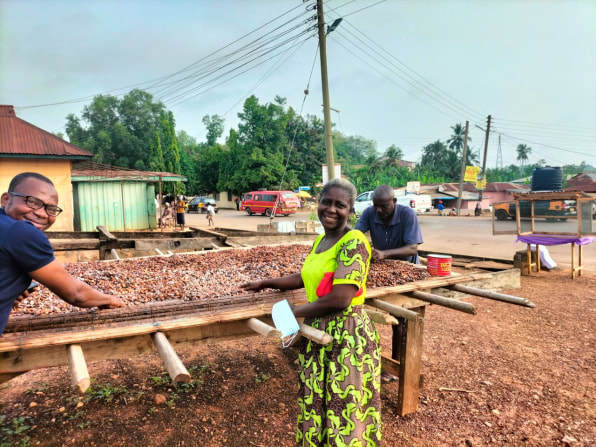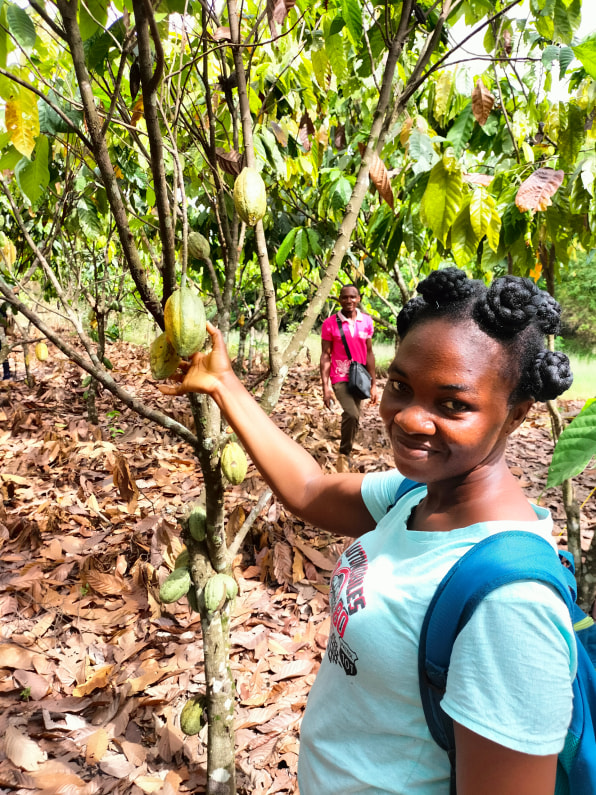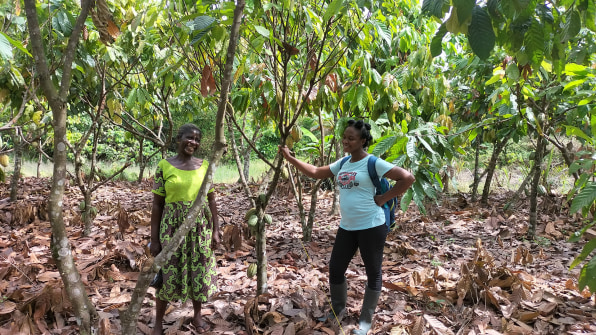[ad_1]
Local weather change is making a nightmare state of affairs for subsistence farmers world wide.
Subsistence farms are usually small operations, typically lower than 2 hectares, with outsize significance to the households that function them, and to the encompassing neighborhood that depends on the crops. As of 2013, nearly 2 billion people on the planet relied on small-scale subsistence farms for survival. However these farms are in hassle: Rising CO2 ranges have elevated the probability and severity of maximum climate occasions like droughts, floods, and wildfires—a development that may depart these farmers with nothing to eat and no cash to purchase meals elsewhere. In accordance with the Meals and Agriculture Group of the United Nations, excessive climate disasters value creating nations’ agriculture sectors $108 billion between 2008 and 2018.
However one firm thinks it could actually assist remedy the issue with a seemingly unlikely software: blockchain.
Utilizing blockchain know-how to guard individuals from local weather change may sound a bit like utilizing gasoline to guard towards a blaze, however the Lemonade Crypto Local weather Coalition, which launched final week, says that’s precisely what it desires to do.

Most blockchain know-how is known for being power intensive: One Bitcoin transaction makes use of sufficient power to energy a mean U.S. home for six weeks, according to some analyses. Put one other approach, every Bitcoin transaction is equal to releasing 402 kilograms of CO2. The Lemonade Crypto Local weather Coalition, a brand new nonprofit arm of insurance coverage tech agency Lemonade Basis, believes it could actually leverage blockchain know-how to offer insurance coverage towards local weather disasters for upward of two billion subsistence farmers on the planet, and keep away from making the planet hotter whereas doing it. The Lemonade Basis is focusing its early efforts in Africa however desires to someday convey its concepts to South America, Asia, and anyplace else the place small-scale farmers want crop insurance coverage.
Local weather insurance coverage is not a new concept, however offering the service to subsistence farmers has been troublesome traditionally. Claims are sometimes small—on the order of tens of {dollars}—which means that it’s extremely troublesome for conventional insurers to underwrite and course of claims and nonetheless earn cash. “Every part’s the wrong way up. It prices you extra to service the declare than the declare itself,” says Daniel Schreiber, Lemonade’s cofounder and CEO.

Lemonade is partnering with climate tech firm Tomorrow.io for the climate monitoring and local weather information that might be used to underwrite and course of insurance coverage claims. “They’ve executed some fairly subtle and extremely granular modeling of climate patterns . . . actually utilizing one of the best information that’s obtainable,” Schreiber says. The information ought to get even higher if Tomorrow.io’s plans to launch a suite of rain-tracking satellites later this 12 months involves fruition.
Lemonade’s proposed resolution is to make use of good contracts—a blockchain function delivered to prominence by Ethereum—to principally automate the payout course of. Sensible contracts are programmable capabilities that execute on a blockchain-backed community. Customers determine the phrases of the contract upfront, and if circumstances are met, cost is issued routinely. For instance, a wager on a March Insanity recreation could possibly be made, and as soon as the sport ends, the community would routinely pay out the winner and deduct cash from the loser. Or, within the case of a candy potato farmer in sub-Saharan Africa, if there’s a drought within the area that exceeds a sure threshold, they may obtain the money worth of their misplaced crops.
Such good contracts are solely pretty much as good as the info you feed them, however blockchains have developed an ancillary know-how, often known as oracles, which are designed to scrape and confirm information from the digital world for precisely this goal. Within the case of Lemonade’s new insurance coverage know-how, oracles would repeatedly monitor information from climate stations and satellites to find out which claims it ought to pay out.
Cascade Tuholske, a postdoctoral analysis scientist on the Columbia Local weather Faculty, says the concept is smart on a regional scale. “On a person farm foundation, to resolve precise crop loss can be fairly exhausting with any present meteorological product, however for a large-scale drought, the final meteorological sample for West Africa or sub-Saharan Africa may be resolved pretty nicely,” he says, including that as satellite tv for pc and climate station information proceed to enhance within the area, fashions are solely anticipated to get higher. “Particularly in West Africa, crop insurance coverage has been proven to be a sturdy technique to shore up farm losses throughout difficult occasions,” he says. “These farmers need assistance.”
What concerning the setting?
Lemonade is nicely conscious of the ecological affect of many conventional blockchains, and seems equally eager to keep away from them. Its insurance coverage product will run on the Avalanche blockchain, which is designed to be low value and environmentally pleasant.
The important thing distinction between Avalanche and plenty of different crypto networks like Bitcoin or Ethereum is that it makes use of “proof of stake” as a substitute of “proof of labor” to validate transactions on the community. For individuals who want a refresher, most blockchains depend on proof of work to validate transactions on the community. In essence, proof of labor requires {that a} system carry out a resource-intensive mathematical computation as a present of excellent religion. This prevents customers from gaming the system and limits vulnerabilities to denial-of-service assaults and different malicious actions as a result of customers have to take a position substantial computing energy to take part.
Proof of stake, alternatively, is a consensus mechanism, which means customers are chosen by the community to validate transactions. Customers with extra property on the community (and thus a better stake in sustaining its constancy) usually tend to be chosen. The “winner” of this choice course of validates a transaction; different customers can then verify the transaction’s validity. (Each consumer who participates within the validation course of earns rewards on the community, typically within the type of the native digital forex.)

Whereas usually not fairly as safe as proof of labor, proof of stake requires orders of magnitude much less power and comes with cheaper, sooner transactions, which is nice for somebody making an attempt to course of a $60 insurance coverage payout for a misplaced crop. On Avalanche, “the transactional prices are a tiny fraction of what they’re on Ethereum,” Schreiber says. “On Ethereum, you possibly can’t do a $5 transaction, since you’ll find yourself paying $30 in transaction charges.”
Getting individuals to enroll
Lemonade is partnering with Pula, a Kenyan firm that has for years been working throughout Africa to offer microfinancing options to farmers. If Pula can ship on its guarantees and persuade customers to enroll, it could possibly be an opportunity for blockchain to undo a number of the hurt it’s executed to the planet. For Schreiber, that’s what makes the mission so thrilling.
“Blockchain is an attention-grabbing know-how in some ways, however one factor that no one might accuse it of proper now could be having a real-world affect,” he says. “That’s what makes this initiative so attention-grabbing. It’s an try to do precisely that: To make use of all of the powers of this novel know-how, to leverage them for what couldn’t be extra actual world: subsistence farmers who’re uncovered to the climate.”
!function(f,b,e,v,n,t,s)
{if(f.fbq)return;n=f.fbq=function(){n.callMethod?
n.callMethod.apply(n,arguments):n.queue.push(arguments)};
if(!f._fbq)f._fbq=n;n.push=n;n.loaded=!0;n.version=’2.0′;
n.queue=[];t=b.createElement(e);t.async=!0;
t.src=v;s=b.getElementsByTagName(e)[0];
s.parentNode.insertBefore(t,s)}(window, document,’script’,
‘https://connect.facebook.net/en_US/fbevents.js’);
fbq(‘init’, ‘1389601884702365’);
fbq(‘track’, ‘PageView’);
Source link
The post Can blockchain tech help farmers get climate insurance? appeared first on Crypto News BTC.
[ad_2]
Source link

Be the first to comment